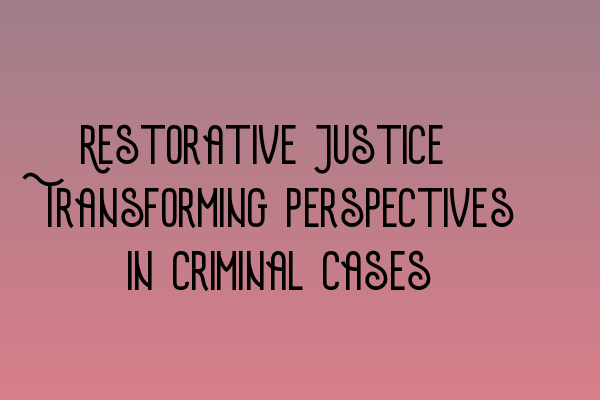Restorative Justice: Transforming Perspectives in Criminal Cases
Restorative justice is an innovative approach that seeks to transform the traditional perspectives in criminal cases. It focuses on the needs of the victims, the offenders, and the community as a whole. Unlike the traditional criminal justice system, which mainly focuses on punishment, restorative justice aims to repair the harm caused by criminal behavior and promote healing.
The Principles of Restorative Justice
Restorative justice is guided by several key principles:
- Inclusion: Restorative justice recognizes the importance of involving all the stakeholders – the victim, the offender, and the community – in the resolution process. Their voices are heard, and they actively participate in finding solutions.
- Accountability: Restorative justice encourages the offender to take responsibility for their actions and make amends for the harm caused.
- Reparation: The focus is not only on punishment but also on repairing the harm and restoring the relationships between the parties involved.
- Transformation: Restorative justice aims to facilitate personal growth and transformation for both the victim and the offender. It provides opportunities for healing and learning from the experience.
The Benefits of Restorative Justice
Restorative justice offers a range of benefits compared to the traditional criminal justice system:
- Empowerment: Restorative justice empowers victims by giving them a voice and an active role in the resolution process. It allows them to express their feelings, ask questions, and seek answers.
- Healing: Through open communication and dialogue, restorative justice provides a platform for healing, both for the victim and the offender. It allows them to address the emotional and psychological impact of the crime.
- Reduced Recidivism: Studies have shown that restorative justice programs have a positive impact on reducing reoffending rates. By addressing the underlying causes of the criminal behavior and promoting accountability, it offers a higher chance of successful rehabilitation.
- Community Reintegration: Restorative justice focuses on restoring the relationships within the community. It promotes understanding, empathy, and social cohesion.
Implementing Restorative Justice
Restorative justice can be implemented through various methods, such as victim-offender mediation, conferencing, circles, or community reparation panels. These processes provide a safe space for open dialogue and allow for the active involvement of all the stakeholders.
It is important for legal professionals to familiarize themselves with restorative justice practices as they can play a crucial role in facilitating the process. By understanding the principles and benefits, solicitors can effectively advocate for restorative justice options for their clients and work towards more holistic and transformative resolutions.
Conclusion
Restorative justice has the potential to transform perspectives in criminal cases. It encourages dialogue, healing, and personal growth, ultimately leading to a more inclusive and compassionate society. Legal professionals should stay informed about restorative justice practices and consider their application in appropriate cases.
For more information about related topics, please refer to the following articles:
- SQE 1 Practice Exam Questions
- SQE 1 Practice Mocks FLK1 FLK2
- SQE 2 Preparation Courses
- SQE 1 Preparation Courses
- SRA SQE Exam Dates
